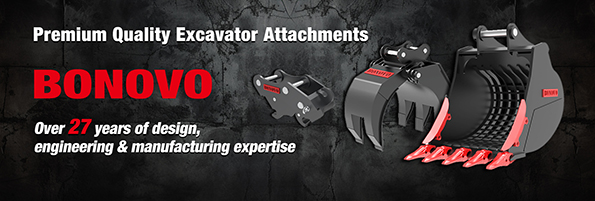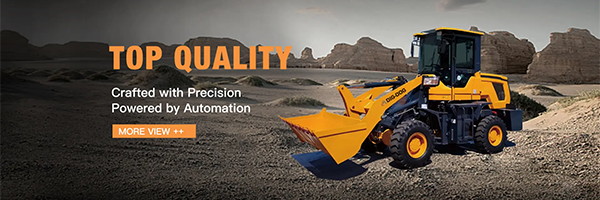1. Engine maintenance
Regularly change the engine oil and oil filter
The engine oil plays an important role in lubrication, cooling, and cleaning in the engine. According to the use of the loader and the manufacturer's recommendations, the engine oil should be changed regularly, generally every 250 hours of work.
At the same time, the oil filter should also be replaced when changing the engine oil to ensure the filtering effect and prevent impurities from entering the engine.
Keep the air filter clean
The function of the air filter is to filter the air entering the engine to prevent dust and impurities from entering the cylinder and causing engine wear. Check the air filter regularly. If too much dust is found, it should be cleaned or replaced in time. Generally, it is cleaned once every 500 hours of work and replaced once every 1000 hours of work.
Check the cooling system
Regularly check the level and quality of the coolant to ensure that the coolant is sufficient and not deteriorated. If the coolant is insufficient, it should be added in time; if the coolant is deteriorated, it should be replaced in time.
At the same time, check whether the radiator is blocked. If it is blocked, it should be cleaned in time to ensure normal heat dissipation of the engine.
2. Hydraulic system maintenance
Regularly replace hydraulic oil and hydraulic oil filter
Hydraulic oil is the working medium of the hydraulic system and has an important impact on the performance and life of the system. According to the use of the loader and the manufacturer's recommendations, the hydraulic oil should be replaced regularly, generally every 2000 working hours or so.
When replacing the hydraulic oil, the hydraulic oil filter should also be replaced to ensure the filtering effect and prevent impurities from entering the hydraulic system.
Check the hydraulic pipelines and joints
Regularly check whether the hydraulic pipelines and joints have oil leakage, looseness, etc. If oil leakage is found, the joints should be tightened or the seals should be replaced in time; if the pipeline is found to be damaged, it should be replaced in time.
At the same time, pay attention to keeping the hydraulic pipeline clean to prevent dust and impurities from entering the system.
Operation precautions
When operating the loader, avoid rough operation to reduce the impact of the hydraulic system. For example, when loading and unloading goods, slowly lift and lower the boom to avoid rapid movements that cause excessive pressure in the hydraulic system.
At the same time, avoid long-term overloading operations to avoid damage to the hydraulic system.
3. Transmission system maintenance
Check the transmission oil
Regularly check the transmission oil level and quality to ensure that the transmission oil is sufficient and not deteriorated. If the transmission oil is insufficient, add it in time; if the transmission oil is deteriorated, replace it in time.
Generally, check the transmission oil every 500 hours or so.
Check the drive shaft and universal joint
Regularly check whether the drive shaft and universal joint are loose or worn. If loose, tighten them in time; if worn, replace them in time.
At the same time, pay attention to keep the drive shaft and universal joint clean to avoid dust and impurities.
Operation precautions
When operating the loader, avoid frequent gear shifting to reduce the impact on the transmission system. For example, during driving, choose the gear reasonably according to the road conditions and load conditions, and avoid starting in high gear and driving at high speed in low gear.
At the same time, avoid long-term neutral sliding to avoid damaging the transmission system.
4. Brake system maintenance
Check the brake pads and brake discs
Regularly check the wear of the brake pads and brake discs. If the brake pads are found to be excessively worn, they should be replaced in time; if the brake discs are found to be cracked or deformed, they should be repaired or replaced in time.
Generally, the brake pads and brake discs are checked every 1000 hours of work.
Check the brake fluid
Regularly check the level and quality of the brake fluid to ensure that the brake fluid is sufficient and not deteriorated. If the brake fluid is found to be insufficient, it should be added in time; if the brake fluid is deteriorated, it should be replaced in time.
At the same time, pay attention to keep the brake system clean and avoid dust and impurities.
Operation precautions
When operating the loader, avoid sudden braking to reduce the impact on the brake system. For example, during driving, slow down in advance to avoid emergency braking.
At the same time, the brake system should be vented regularly to ensure the normal operation of the brake system.
V. Tire maintenance
Keep the tire pressure normal
Check the tire pressure regularly to ensure that the tire pressure meets the manufacturer's regulations. Too high or too low tire pressure will affect the service life of the tire and the driving performance of the loader.
Generally, check the tire pressure every 50 hours of work.
Check tire wear
Check tire wear regularly. If tires are found to be excessively worn, they should be replaced in time. At the same time, pay attention to check whether the tires have cracks, cuts, etc. If so, they should be repaired or replaced in time.
Generally, check tire wear every 1,000 hours of work.
Operation precautions
When operating a loader, avoid sharp turns and sudden braking to reduce tire wear. For example, during driving, turn slowly and avoid sudden steering.
At the same time, avoid overloading to avoid damaging tires.
VI. Electrical system maintenance
Check the battery
Regularly check the battery power and electrolyte level to ensure that the battery power is sufficient and the electrolyte level is normal. If the battery power is insufficient, charge it in time; if the electrolyte level is too low, add distilled water in time.
Generally, check the battery every 100 hours of work.
Check wires and connectors
Regularly check wires and connectors for damage, looseness, etc. If the wire is found to be damaged, it should be replaced in time; if the joint is found to be loose, it should be tightened in time.
At the same time, pay attention to keep the electrical system clean and avoid dust and impurities.
Operation precautions
When operating the loader, avoid idling for a long time to avoid damaging the battery and generator. For example, when waiting for work, you can turn off the engine to save fuel and reduce emissions.
At the same time, avoid using electrical equipment in a humid or watery environment to avoid short circuit failure.
Daily Maintenance Guide for Loader Parts
- BONOVO
- Counselor
- Posts: 645
- Joined: Oct 17th, '24, 02:50
- Location: China
Daily Maintenance Guide for Loader Parts
Choose BONOVO for high-quality, customizable brush cutters for skid steers with fast delivery. Contact us today to discover how our superior products can enhance your land management tasks!
for more info just visit our website at www.bonovogroup.com
contact # : +86 158 6218 2088
email : sales@bonovogroup.com
for more info just visit our website at www.bonovogroup.com
contact # : +86 158 6218 2088
email : sales@bonovogroup.com

